“It’s important to collect and keep these things so we have the voices of everyone, not just people interviewed for the newspaper or television,” Lisa Rickey, archivist and collections manager, said. “That’s how we find out what it is was really like for everyone.”
More than a dozen submissions have been donated and the Special Collections & Archives would like to collect more.
The experiences of medical students, physicians, personal shoppers, parents and historians are among the donations.
“This is the first entry for my Covid 19 pandemic diary. Today, I am shadowing at the hospital to orient myself in preparation for hospital rounds when our surge hits this community.
“When I need that (N95) mask, I will be moving into an RV that was loaned to me. It is parked in my driveway. My husband is not very excited about this separation or my caution. However, my family means so much to me and I feel very responsible for doing everything I can to keep this virus away from them.” – Physician, Henry County, Ind.
Many of the submissions capture the earliest days of the pandemic when the months ahead were unclear.
“I, and a wave of graduating medical students, will be christened by chaos into the field of medicine. But in this moment, in relatively sleepy Dayton, Ohio, we wait and quietly prepare for the storm.” – Wright State University medical student
Bill Stolz, reference and outreach archivist at WSU, documented his own experiences in words and photographs.
“As an archivist and historian, I thought it was important to capture what we were experiencing — that once in a lifetime or once in a century event we’re all participants in.”
Stolz photographed empty parking lots and store shelves and a bag filled with “paper gold” — hard to find toilet paper.
In a brief paragraph he described the wonder as the Dayton area shut down.
“April 7, 2020: tonight we went outside to look at the full moon. At 10:30 we were struck more with the silence, no car traffic, no airplanes, just quiet. It was amazing to stand under the moon and stars in our neighborhood, usually bustling with noise, and not hear a thing.”
The reflections will be valuable tools to understand today’s historic events in the future.
“The more accounts we can get into libraries and archives for historians of the future the better,” Rickey said. “Then anyone will be able to summarize the experience and see common themes.”
For example, the diary of Bishop Milton Wright, the father of Orville and Wilbur Wright, is among the artifacts in Wright State’s archives often used for researching Dayton’s famed aviators.
Handwritten journal entries by Donald McKinney Wallace, a New Carlisle farmer, have been extremely relevant in the past year.
Wallace describes quarantining in Army barracks at the University of Cincinnati in the fall of 1918 during another pandemic. He survived but the Spanish influenza caused 50 million deaths worldwide with 675,000 in the United States.
First person accounts are incredible tools for students who can “look at history and see how sometimes it changes and sometimes we come right back to where we started,” Stolz said.
While keeping a personal account is important for future generations to study, writing can also be therapeutic.
“Day 4. Wow. That’s all I can say. My emotions are ranging from sadness to fear to anger to hope. Sadness that I will not be permitted to be at the hospital when my daughter gives birth. I will not hold my grandbaby in my arms for a long time. This weighs heavy on my heart. Fear of the virus for so many reasons. I’m susceptible, the baby, everyone. Fear for my friends who are on the front lines. Anger that this is even happening. Anger that there are some people who refuse to do what is necessary. - Sherri, Springboro
Diaries are impactful because there is a personal connection no matter when they were written, Rickey said. “We see ourselves in them.”
Wright State University’s Special Collections & Archives has more information about the Document Your Story project and how to donate on their website. Visit libraries.wright.edu/special.
About the Author
